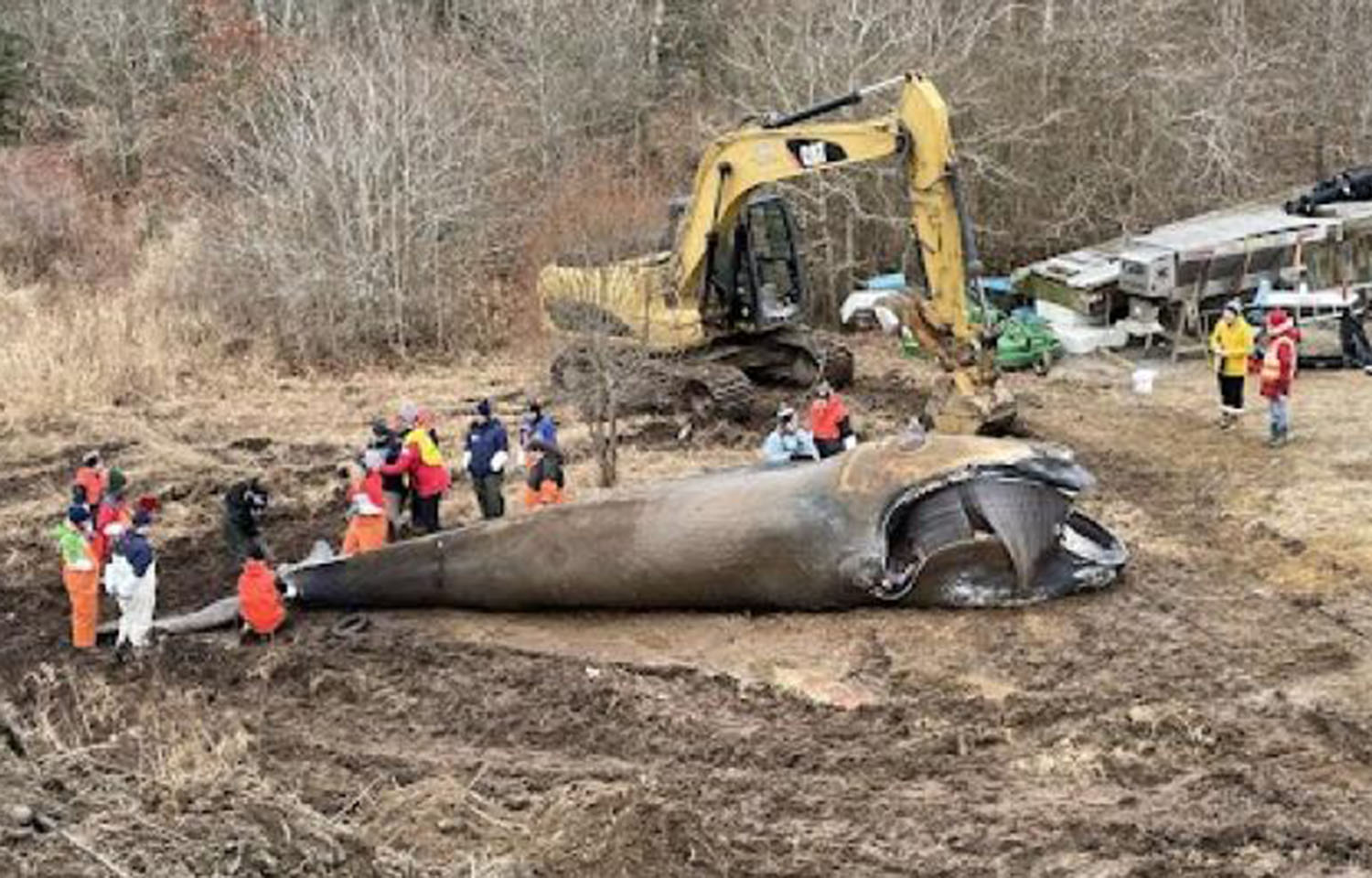After a North Atlantic right whale washed up on Martha’s Vineyard – an island 7 miles off the coast of the U.S. state of Massachusetts – on 28 January, a subsequent necropsy performed on the whale’s body revealed evidence that its cause of mortality was entanglement in lobster-fishing gear.
NOAA Fisheries said its independent analysis of the gear found purple marks consistent with gear-marking requirements for Maine lobstermen.
The full necropsy report on the whale, which researchers determined was a 3-year-old female, found deeply embedded rope with no evidence of blunt force trauma, indicating the whale died as a result of entanglement.
This was not the first time this specific whale became entangled in fishing gear. In August 2022, the same whale was spotted entangled in fishing gear in Canaidan waters in the Gulf of St. Lawrence – an entanglement that was not immediately fatal but one that may have contributed to the whale’s ultimate demise, according to NOAA.
“Multiple attempts were made to disentangle the whale off Cape Cod in January and February 2023. She was resighted still entangled in June 2023 in the Gulf of St. Lawrence, with her overall body condition declining as the rope constricted around her tail, becoming more deeply embedded,” according to a summary issued by the New England Aquarium after the whale’s death.
Maine Department of Marine Resources (DMR) Commissioner Patrick Keliher confirmed the gear found lodged in the whale’s body was consistent with Maine-based trap gear.
“This is very unfortunate; our goal is zero entanglements. Certainly, this is a rare event; in fact, it is the first right whale entanglement [involving] known Maine gear since 2004. It is also the first right whale mortality with known Maine gear that DMR is aware of since the establishment of the Take Reduction Plan,” Keliher said, referring to a plan NOAA originally released in 1997 and updated several times since that aims to reduce instances of serious injury and mortality to right, humpback, and fin whales in the North Atlantic.
The Maine DMR said it has not concluded whether the gear found entangled on the whale is consistent with state or federal gear. Additionally, no buoy was collected with the rope, which could have further helped identify the gear owner and the potential precise location where the entanglement took place.
The Maine Lobstermen’s Association (MLA) echoed the DMR’s sentiments that the entanglement was an unfortunate, yet accidental, incident.
“The MLA is deeply saddened by the death of a juvenile right whale that the [National Marine Fisheries Service] has attributed to the Maine fishery,” the association said. “Maine lobstermen have significantly changed how they fish over the last 25 years to avoid entanglement and continue gear testing. The MLA will continue this important work as we review the data and evidence that NMFS has collected. MLA remains committed to finding a solution to ensure a future for right whales and Maine’s lobster fishery.”
Environmental groups have also responded to the incident, lamenting the fact that fewer than 70 of the reamining 360 North Atlantic right whales are of reproductive age. The Natural Resources Defense Council (NRDC) and the Center for Biological Diversity criticized Maine's lobster fishing for its longstanding denial it has been responsible for any right whale deaths.
"For years, some representatives of the Maine lobster industry have speciously claimed that its gear has never been linked to a recent death of an endangered North Atlantic right whale," NRDC said in a statement. "It is now clear right whales can and do get entangled in fishing gear in Maine waters."
CBD Oceans Campaigner Ben Grundy said a bigger push is needed to both enforce speed limits for vessels in areas frequented by whales and convert fishing operations toward using pop-up gear considered safer for whales in Maine's lobster fishery.
"This poor whale’s death is heartbreaking proof that Maine fishing gear is putting North Atlantic right whales and other marine animals at risk,” Grundy said. “I’m infuriated that efforts to stop these magnificent animals from going extinct have become so politicized, undermining solutions like pop-up gear and commonsense ship speed limits."
Maine's fishing industry has pushed back against federal mandates requiring it to change its practices. In June 2023, a U.S. District Court of Appeals panel ruled in the industry's favor, ordering the National Marine Fisheries Service to vacate a 2021 biological opinion regarding North Atlantic right whales that led to more stringent rules being implemented for lobster fishing.
U.S. Rep. Jared Golden (D-Maine) released a statement on 14 February defending Maine's lobster industry from criticism.
“Maine’s lobster industry is the backbone of communities up and down our coast,” Golden said. “The death of this whale is unfortunate, but we have to be real about tradeoffs. I will continue to stand with Maine’s lobstermen in the face of any effort to use this incident to justify new mandates that would threaten their livelihoods and the foundation of communities that depend on this fishery.”
Additional reporting by SeafoodSource
Photo courtesy of NOAA







